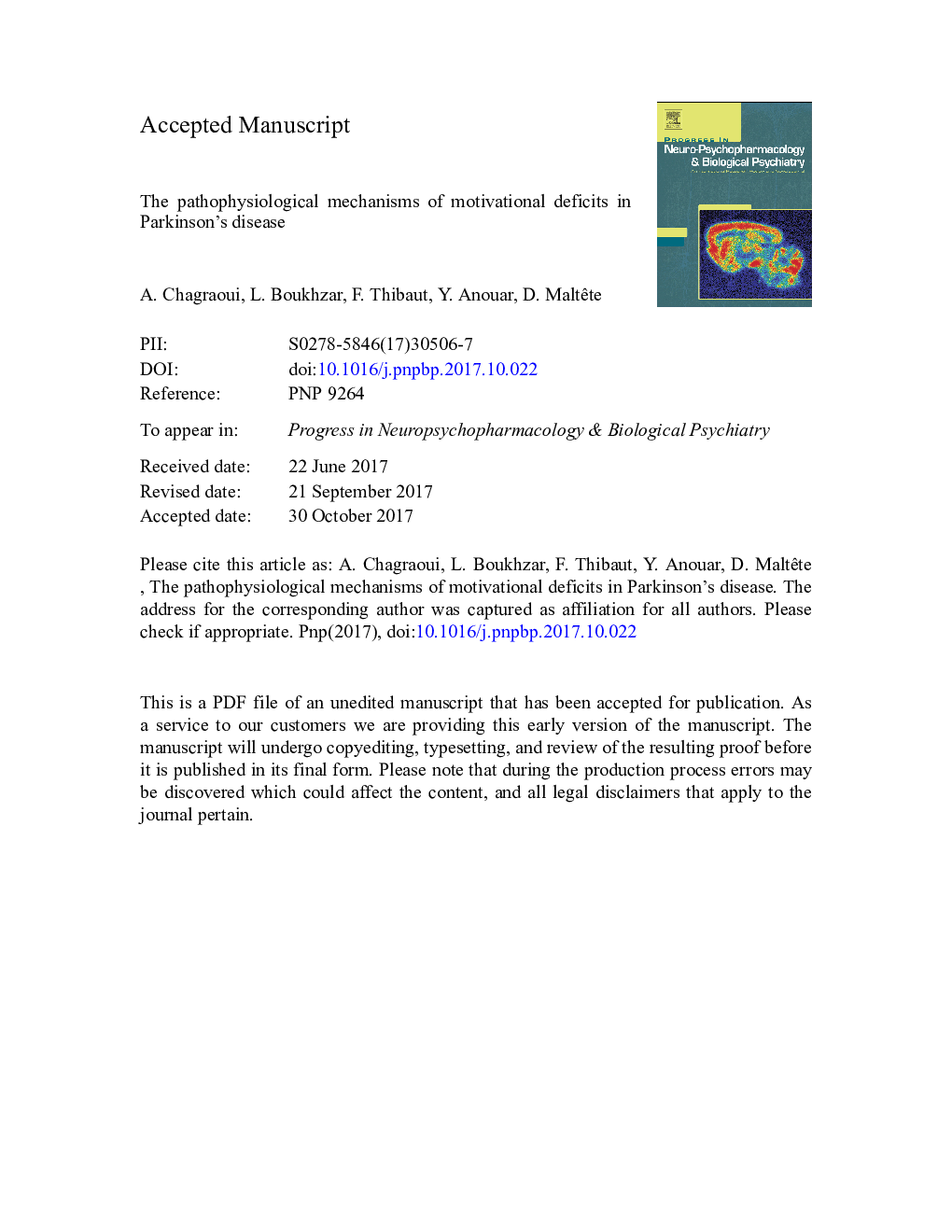| کد مقاله | کد نشریه | سال انتشار | مقاله انگلیسی | نسخه تمام متن |
|---|---|---|---|---|
| 8537618 | 1561013 | 2018 | 55 صفحه PDF | دانلود رایگان |
عنوان انگلیسی مقاله ISI
The pathophysiological mechanisms of motivational deficits in Parkinson's disease
ترجمه فارسی عنوان
مکانیسم های پاتوفیزیولوژیک نقص های انگیزشی در بیماری پارکینسون
دانلود مقاله + سفارش ترجمه
دانلود مقاله ISI انگلیسی
رایگان برای ایرانیان
کلمات کلیدی
DBSApathy Evaluation ScaleLARSD3RDRNDLPFCD2R5-hydroxytryptamineMDS6-Hydroxydopamine5-HT6-OHDAAes - AESimpulse control disorder - اختلال کنترل ضربهattention deficit hyperactivity disorders - اختلالات بیش فعالی کمبود توجهMRI - امآرآی یا تصویرسازی تشدید مغناطیسیADHD - بیشفعالیdeep brain stimulation - تحریک عمقی مغزMagnetic resonance imaging - تصویربرداری رزونانس مغناطیسیfunctional magnetic resonance imaging - تصویرسازی تشدید مغناطیسی کارکردیfMRI - تصویرسازی تشدید مغناطیسی کارکردیICD - دفیبریلاتورهای کاردیوورتر کاشتنیDopamine - دوپامینbasal ganglia - عقدههای قاعدهایdorsolateral prefrontal cortex - قشر پیشانی غدد درون رحمیanterior cingulate - مقطع قدامی قدامیdorsal raphe nucleus - هسته رافهD3 dopamine receptor - گیرنده dopamine D3D2 dopamine receptor - گیرنده دوپامین D2
موضوعات مرتبط
علوم زیستی و بیوفناوری
علم عصب شناسی
روانپزشکی بیولوژیکی
چکیده انگلیسی
Parkinson's disease (PD) is a progressive degenerative disorder that leads to disabling motor symptoms and a wide variety of neuropsychiatric symptoms. Apathy is the most common psychiatric disorder in the early stages of untreated PD and can be defined as a hypodopaminergic syndrome, which also includes anxiety and depression. Apathy is also considered the core feature of the parkinsonian triad (apathy, anxiety and depression) of behavioural non-motor signs, including a motivational deficit. Moreover, apathy is recognised as a distinct chronic neuropsychiatric behavioural disorder based on specific diagnostic criteria. Given the prevalence of apathy in approximately 40% of the general Parkinson's disease population, this appears to be a contributing factor to dementia in PD; also, apathy symptoms are factors that potentially contribute to morbidity, leading to a major impairment of health-related quality of life, thus stressing the importance of understanding the pathophysiology of this disease. Several studies have clearly established a prominent role for DA-mediated signals in PD apathy. However, synergistic interaction between dopaminergic impairment resulting from the neurodegenerative process and deep brain stimulation of the subthalamic nucleus may cause or exacerbate apathy. Furthermore, serotoninergic mechanism signalling is also likely to be of importance in this pathophysiology.
ناشر
Database: Elsevier - ScienceDirect (ساینس دایرکت)
Journal: Progress in Neuro-Psychopharmacology and Biological Psychiatry - Volume 81, 2 February 2018, Pages 138-152
Journal: Progress in Neuro-Psychopharmacology and Biological Psychiatry - Volume 81, 2 February 2018, Pages 138-152
نویسندگان
A. Chagraoui, L. Boukhzar, F. Thibaut, Y. Anouar, D. Maltête,
